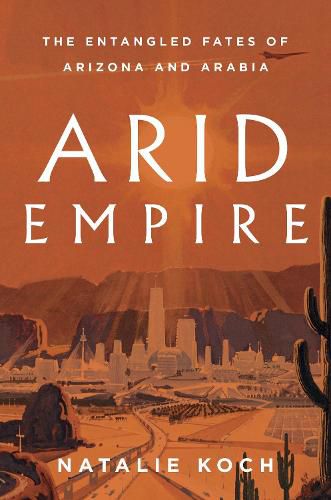Readings Newsletter
Become a Readings Member to make your shopping experience even easier.
Sign in or sign up for free!
You’re not far away from qualifying for FREE standard shipping within Australia
You’ve qualified for FREE standard shipping within Australia
The cart is loading…






The iconic deserts of the American southwest could not have been colonized and settled without the help of desert experts from the Middle East. For example: In 1856, a caravan of thirty-three camels arrived in Indianola, Texas, led by a Syrian cameleer the Americans called Hi Jolly. This camel corps, the US government hoped, could help the army secure the new southwest swath of the country just wrested from Mexico. Though the dream of the camel corps - and sadly, the camels - died, the idea of drawing on expertise, knowledge, and practices from the desert countries of the Middle East did not.
As Natalie Koch demonstrates in this evocative, narrative history, the exchange of colonial technologies between the Arabian Peninsula and United States over the past two centuries - from date palm farming and desert agriculture to the utopian sci-fi dreams of Biosphere 2 and Frank Herbert’s Dune - bound the two regions together, solidifying the colonization of the US West and, eventually, the reach of American power into the Middle East. Koch teaches us to see deserts anew, not as mythic sites of romance or empty wastelands but as an arid empire, a crucial political space where imperial dreams coalesce.
$9.00 standard shipping within Australia
FREE standard shipping within Australia for orders over $100.00
Express & International shipping calculated at checkout
The iconic deserts of the American southwest could not have been colonized and settled without the help of desert experts from the Middle East. For example: In 1856, a caravan of thirty-three camels arrived in Indianola, Texas, led by a Syrian cameleer the Americans called Hi Jolly. This camel corps, the US government hoped, could help the army secure the new southwest swath of the country just wrested from Mexico. Though the dream of the camel corps - and sadly, the camels - died, the idea of drawing on expertise, knowledge, and practices from the desert countries of the Middle East did not.
As Natalie Koch demonstrates in this evocative, narrative history, the exchange of colonial technologies between the Arabian Peninsula and United States over the past two centuries - from date palm farming and desert agriculture to the utopian sci-fi dreams of Biosphere 2 and Frank Herbert’s Dune - bound the two regions together, solidifying the colonization of the US West and, eventually, the reach of American power into the Middle East. Koch teaches us to see deserts anew, not as mythic sites of romance or empty wastelands but as an arid empire, a crucial political space where imperial dreams coalesce.